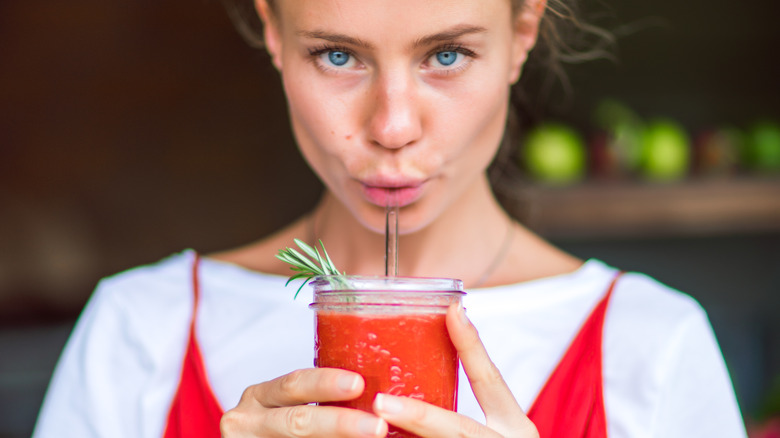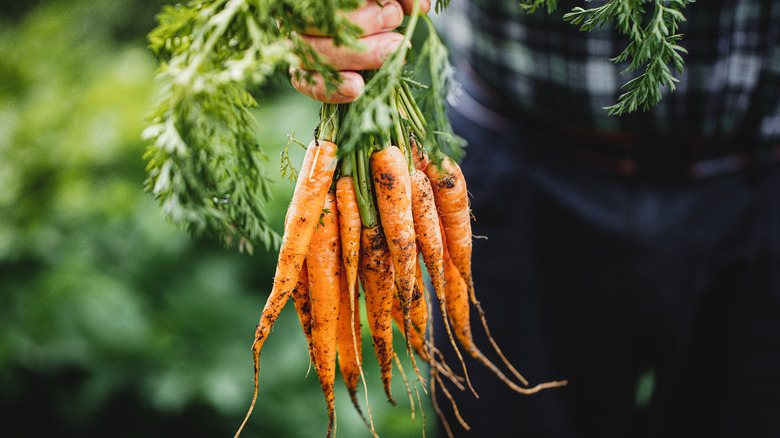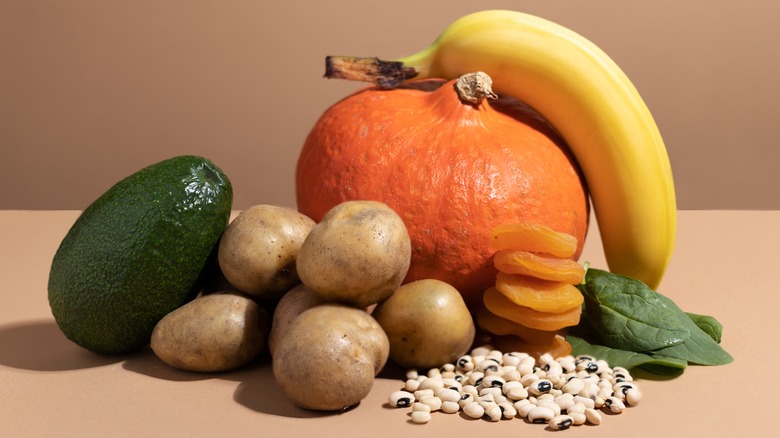Drinking V8 Juice Won't Meet These Daily Vitamin Requirements
With many ready-to-drink options out there to supplement your diet, V8 is one of the original vegetable juices that can give you low-calorie nutrition without added sugar or artificial flavors. You'll only find the juices of tomatoes, carrots, celery, beets, and a few other vegetables with a little added salt, beta-carotene, and citric acid. An 8-ounce serving of V8 juice has just 45 calories with zero fat, 9 grams of carbs, 2 grams of fiber, and 2 grams of protein. Granted, you won't be relying on V8 for your daily fiber or protein, but it will give you 72 milligrams of vitamin C. Just one V8 puts you at 80% of your daily recommendation for vitamin C.
Although a serving of V8 gives you 180 micrograms of vitamin A, you'll need to drink five bottles to get a full day's supply of this important vitamin. V8 is also a good source of potassium with 470 milligrams of this vital electrolyte, but it only gives you 10% of what you need each day. Rather than rely on V8 as your chief source of vegetables, registered dieticians told Parade that you'll need to add other foods to get your required vitamin A and potassium.
How to get more vitamin A
Vitamin A comes in two forms — preformed vitamin A and carotenoids like alpha- and beta-carotene. Animal foods are often sources of vitamin A, but carotenoids are often derived from plants. The Recommended Dietary Allowance for vitamin A is 900 micrograms for men and 700 micrograms for women. Vitamin A can help protect against lung cancer and possibly prostate cancer. Improved memory, learning, and attention have been linked to people whose blood had higher levels of alpha-carotene, which is found in fruits, green leafy vegetables, and orange vegetables. Lutein and zeaxanthin, which are alpha-carotenoids, could protect the retina against age-related macular degeneration, according to the Harvard T.H. Chan School of Public Health.
Sources of vitamin A include leafy greens, like kale and spinach, and yellow and orange vegetables, such as carrots and sweet potatoes. Vitamin A is also found in fruits, like tomatoes, cantaloupes, and mangoes, and animal sources, like beef liver, fish oils, milk, and eggs.
A vitamin A deficiency can result in mild symptoms like fatigue and susceptibility to infections, while severe deficiency leads to night blindness and severe eye dryness.
How to get more potassium
Potassium is a vital mineral essential for your kidney and heart function, according to the National Institutes of Health. It aids in the generation and regulation of nerve cell impulses, which is critical for muscle contractions, including in the heart.
Men require 3,400 milligrams of potassium a day while women need 2,600 milligrams. Dietary sources of potassium include dried apricots, prunes, raisins, bananas, potatoes, spinach, tomatoes, lentils, kidney beans, milk, yogurt, and meats. Potassium supplements are usually low in potassium with less than 100 milligrams. However, be careful about salt substitutes, which can be high in potassium, especially if you're taking certain medications. Too much potassium can cause numbness and tingling. It can also cause muscle weakness, nausea, tiredness, paralysis, and abnormal heart rhythms.
People with inflammatory bowel disease or those using medications like laxatives or diuretics may struggle to maintain adequate potassium levels. Insufficient potassium could lead to high blood pressure, especially if your diet is high in sodium.



